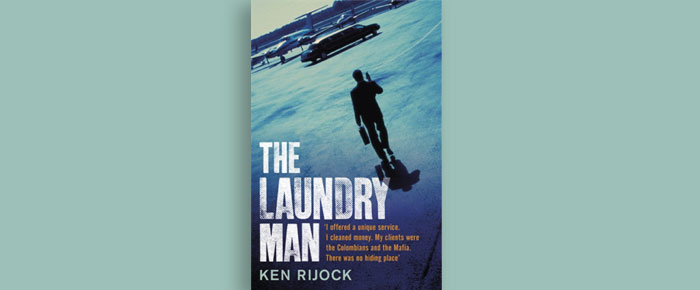
Rob Goldfinger had the opportunity to speak with Miami financial crime consultant Kenneth Rijock, whose first-person story, The Laundry Man details his decade as a career money launderer.
Robert Goldfinger: In your book, The Laundry Man, you give a fascinating account of your journey from successful lawyer to money launderer, then transitioning back to the "good guy." Share with me what enticed you to go down the path of criminal activities?
Kenneth Rijock: It was a perfect storm; the combination of a difficult home situation ending in my divorce, with no children, and entering a new social circle that included several fellow Vietnam veterans, all of whom shared my 1960s perspective on the position that personal drug use should not be criminalized. When I discovered that my new friends were not exactly whom they appeared to be, the fact that they were involved in drug smuggling did not deter me, as this was freewheeling Miami in the 1980s. I then believed in decriminalization, but my experiences since have caused me to presently support the anti-drug laws.
RG: As detailed in the book most, if not all, of your criminal activities took place in South Florida and the Caribbean. Why was that geographical area a prime venue for your criminal activities, and to the best of your knowledge, how has that changed?
KR: At that time, Florida was in the epicenter of the narcotics trafficking world in North America, as well as the location of much of the money laundering, and bulk cash smuggling. I did not have to go far to find cooperative offshore tax havens, where they asked no questions about source of funds, and beneficial ownership of companies that I was forming, through local counsel. Though today it is not as overt, Caribbean tax havens continue to facilitate massive amounts of drug money laundering.
RG: You mentioned in the book that you came from a humble immigrant background. Did your immigrant family experience work as a compass to guide you out of criminal activity or was there another catalyst?
KR: The major influences, those individuals who I believe brought me back from a dark place, were not my conservative family, but a United States Marshal and a police Sergeant from Florida, who showed me that I needed to be part of the solution, and not part of the problem when it came to money laundering. Their confidence in me guided me back to the light.
RG: It is obvious that your time in prison was not a pleasant experience. Prison sentences are becoming more frequent for financial crime convictions. Do you think this has an impact on criminal behavior or the decision to become involved in criminal activity?
KR: Unfortunately, most financial criminals never consider the possibility that they may one day be convicted of a felony. Most think that their scam is too good to be identified, so they do not fear arrest. This is called denial and it ignores reality. The respective 50 and 150 year sentences meted out to Scott Rothstein and Bernard Madoff, the two biggest Ponzi schemers, will not deter others in my humble opinion, for successful fraudsters are generally far to arrogant to take the risk of arrest seriously.
RG: In your activities you moved a lot of cash. Has technology changed the methods?
KR: Yes, though bulk cash smuggling, where money launderers move the proceeds of crime into a cooperating offshore jurisdiction, the rise of technology has opened many new targets of opportunity through which laundrymen can successfully complete their illegal missions, including international trade, virtual currency, online creation of corporations, and the expansion of tax haven products and services. All which have moved money laundering forward and decreased the risk of identification, interdiction and arrest. Money laundering is more efficient now and easier to accomplish, unfortunately.
RG: What advice do you have for a lawyer or compliance officer that may be considering improper or illegal activities?
KR: Ladies and gentlemen: All the money and adult toys in the world are not worth the consequences of arrest, conviction, and incarceration, especially for a professional, for he or she will not be able to return to their previous life after their incarceration is completed. They will be forever stigmatized and find that the path to legitimacy is a long, hard road, with many obstacles in their way. Your reputation is priceless, and once lost can rarely be restored.
RG: In the book, you chronicle the years-long criminal investigation conducted by law enforcement. What was it like to live under that uncertain cloud?
KR: The daily pressure was intense, and it continued even when I was off duty, for one never knew when the proverbial "knock on the door" would come, as you always knew it would. I found the stress similar to that which I experienced while serving in the U.S. Army in Vietnam and Cambodia during the war; a dull pain, or feeling in the back of your mind that there was trouble headed your way, and that your future was not bright.
RG: What are five "bits of wisdom" that you would like to share with those of us in the financial crimes prevention community?
KR:
- Money launderers are as educated, as smart as, and more innovative than you are; they often speak more languages, and have previously been bankers and lawyers. Do not underestimate them.
- Good money launderers are forever looking for weaknesses in your bank's compliance program, and when they find one, they drive a truck through it and successfully move illicit funds. Keep updating your program. Pick up new software and commercial database resources that will be useful tools.
- Do not neglect your in-house AML/CTF training program. Often, only senior compliance staff is sent to seminars and conferences; send your junior frontline staff as well.
- Make sure that you periodically check your most valuable and successful bank customers, lest they turn out to be Ponzi schemes whose operation was overlooked by enthusiastic customer relationship managers.
- Above all, regard compliance as a challenge and an adventure, as I did when I served in that capacity; use your imagination, because rest assured that your money laundering opponents are staying up nights and weekends creating schemes to move money through your bank.
Interviewed by: Robert Goldfinger, CAMS, CFS Cmdr. CID (retired), president, Nomino Data, USA, rgoldfinger@nominodata.com











Thanks for the interview and points of wisdom – Lee
insightful answers. where can I get a copy of the the book? Thanks.
http://www.amazon.com/The-Laundry-Man-Kenneth-Rijock/dp/0241954177